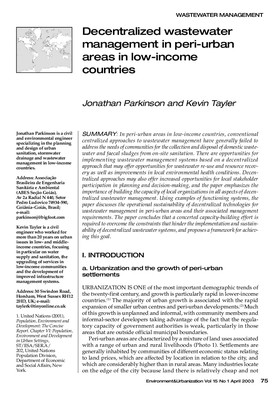Decentralized wastewater management in peri-urban areas in low-income countries

In peri-urban areas in low-income countries, conventional centralized approaches to wastewater management have generally failed to address the needs of communities for the collection and disposal of domestic wastewater and faecal sludges from on-site sanitation. There are opportunities for implementing wastewater management systems based on a decentralized approach that may offer opportunities for wastewater re-use and resource recovery as well as improvements in local environmental health conditions. Decentralized approaches may also offer increased opportunities for local stakeholder participation in planning and decision-making, and the paper emphasizes the importance of building the capacity of local organizations in all aspects of decentralized wastewater management. Using examples of functioning systems, the paper discusses the operational sustainability of decentralized technologies for wastewater management in peri-urban areas and their associated management requirements. The paper concludes that a concerted capacity-building effort is required to overcome the constraints that hinder the implementation and sustainability of decentralized wastewater systems, and proposes a framework for achieving this goal.
Cite this publication
Available at https://www.iied.org/g00485